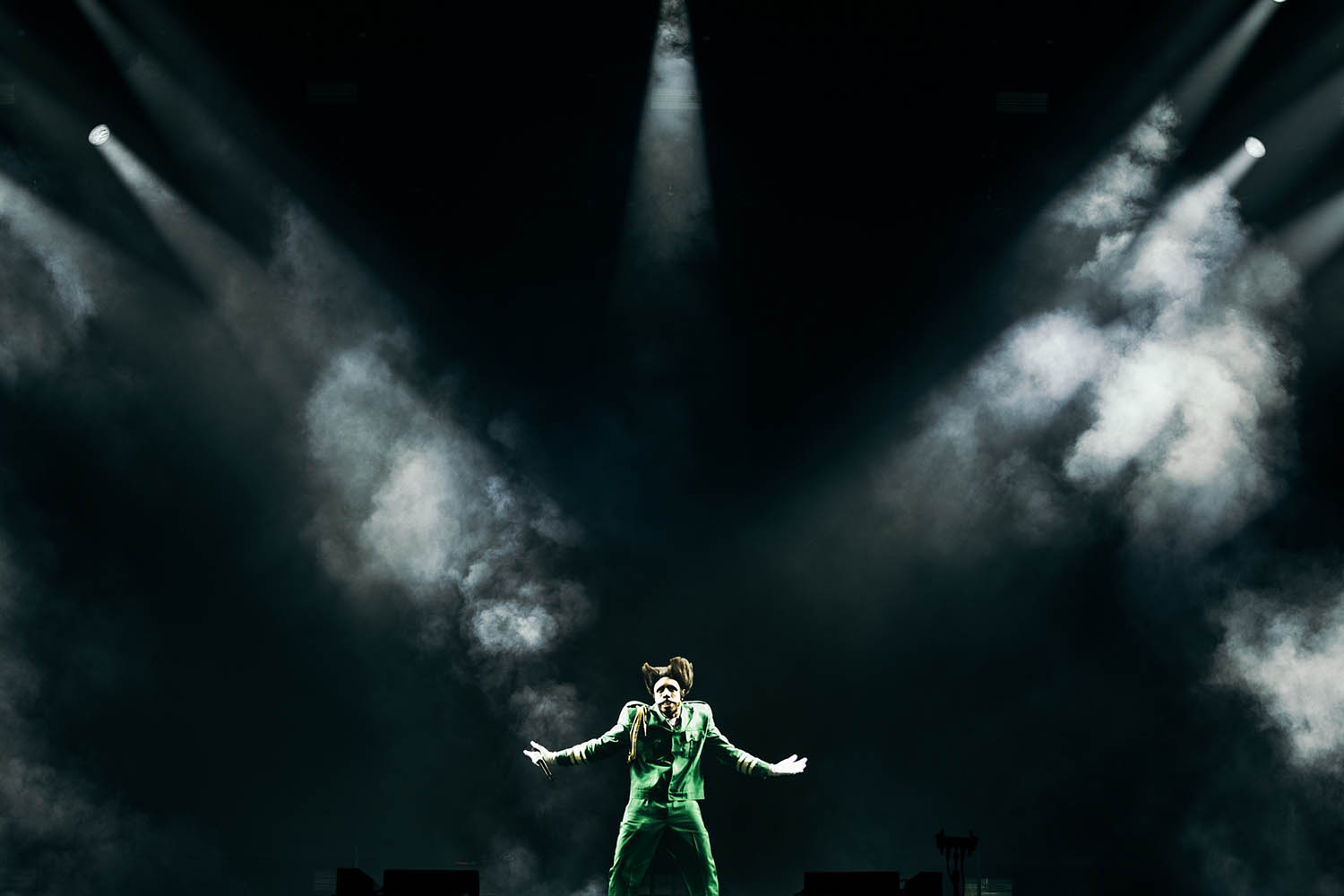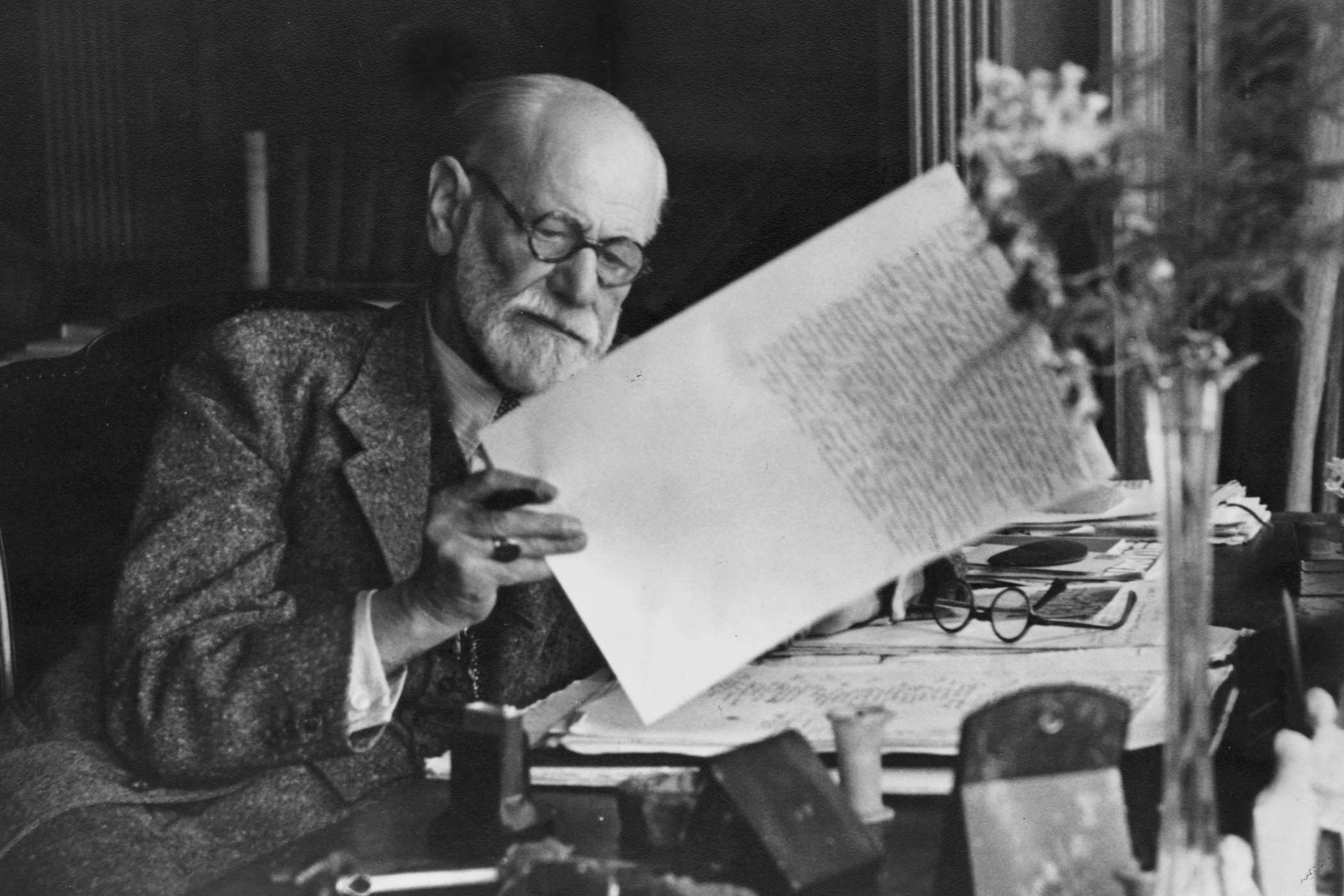Tyler, the Creator
O2 Arena, London SE10
Tyler, the Creator is alone on a vast freight container of a stage, kept warm by frequent blasts of pyro and lurid green lighting. There’s no band, no DJ or hype man, but the Los Angeles rapper isn’t lonely. He brings with him more concepts, personae, choreography, camera angles and visuals for one three-night run in London, marking his most recent album, last October’s Chromakopia, than many artists fit into an entire career.
Eight albums into Okonma’s solo canon – and two fashion labels into a streetwear side hustle – he is legion. Recent Bowie-like aliases include Igor, a glam, wig-wearing outsider character from the Grammy-winning 2019 album of the same name, and Tyler Baudelaire, the smooth central figure from 2021’s Grammy-winning Call Me If You Get Lost LP.
Tyler Okonma’s own character arc bears repeating. Having started out as a homophobic, skateboarding punk-rap provocateur in the hyperbolically talented 00s collective Odd Future Wolf Gang Kill Them All (which also spawned Frank Ocean, Earl Sweatshirt and Syd), he has now become an older, queerer, creative outlier, wrestling with personal demons to a soundtrack of sweeter music.
Tonight, Okonma will mostly be playing the part of Saint Chroma, a kind of militaristic cult leader who wears a prosthetic mask not unlike Tyler’s face. His hair is styled into twin peaks, potentially with reference to a traditional Rwandan hairstyle, the amasunzu. He moves through the first third of his set like Michael Jackson crossed with Frankenstein’s monster, sometimes lurching, sometimes floating on tiptoe.
All this is captured by cameras projecting on to multiple screens trained on his feet, hands and face: standard arena craft, but taken to the next level and underlining Chromakopia’s obsession with being scrutinised. You can see Tyler’s bootlace is undone, providing some low-key jeopardy. Somehow there are even cameras streaming from inside the moshpit during Sticky, one of the album’s busiest tracks.
The full meaning of Chromakopia continues to be debated online. Chroma the Great, the conductor whose music paints the dawn and dusk in children’s fantasy novel The Phantom Tollbooth, may be one source for Saint Chroma. But one of the record’s central conceits is how we all wear masks, and how hard it is to take them off – particularly once you’re as famous as Tyler is, and have a tendency towards paranoia. He plays Chromakopia almost in full, underlining the strengths of his most commercially successful album to date worldwide.
Rah Tah Tah stakes his claim to be “the biggest out the city after Kenny, that’s a fact now” – a reference to the Pulitzer-winning, Drake-slaying Kendrick Lamar, whose tour comes to the UK in July. That song’s closing chorus – “I’m paranoid now!” – leads neatly into Noid, a bass-heavy polemic about how Tyler fears everyone: stalker fans, his neighbours, the women who might entrap him into fatherhood. (The track’s blasts of guitar nod to Black Sabbath, authors of a track called Paranoid, although these guitars more closely recall War Pigs.)
Cameras projecting on to multiple screens are trained on his feet, hands and face. An undone bootlace provides some low-key jeopardy
Cameras projecting on to multiple screens are trained on his feet, hands and face. An undone bootlace provides some low-key jeopardy
Artists frequently have to contend with how to work their back catalogue into a new set. Okonma has come up with a wheeze that sounds lazy on paper but works very well in real life.
Newsletters
Choose the newsletters you want to receive
View more
For information about how The Observer protects your data, read our Privacy Policy
On a stage dressed like a living room, he changes into civvies and rifles through a box of vinyl records where OutKast’s Stankonia is next to Burt Bacharach and Erykah Badu. Selecting his own records – Igor and 2011’s problematic Goblin among them – he places them on to a turntable then lounges on a couch or spins on a piano stool. Sometimes he sings bits of tracks – the fantastic She; the key track Sorry Not Sorry, where Okonma expresses some regret at having been a jerk – or just conducts crowd choruses.
There are tender moments, such as the swoonsome Darling, I, a love song that explains how Tyler just can’t commit romantically. One of the section’s highlights, Take Your Mask Off, finds him rapping ferociously about people living a lie, including, it seems, himself. The mask comes off. From his floating bridge he also manages to drop a microphone on someone’s head, later asking the crowd to boo him. “Are you calling me a wanker?” he asks, clearly thrilled at the chant that follows the boos. Offhand and spontaneous, these interludes are in stark contrast to the high-concept main event.
Goblin was the record whose violent imagery, misogyny and homophobia earned him a four-year ban from touring in the UK. That was before “the Flower Boy gay shit”, he says, referencing the 2017 album that marked his coming out and mellowing. “This is incredible,” he beams, at the fact of his redemption, and this sold-out tour.
When he returns to the main stage, it’s as Tyler resolved, integrated, at his most authentic – at least in theory. He doubles down on justifications on a blistering, a cappella Thought I Was Dead, then poignantly works through his longstanding daddy issues on Like Him, but with a twist: his mother’s recorded confession that it was her own choices that kept Tyler’s biological father away.
Figuring out who Tyler, the Creator really is has been something of a vexed business, not least for Okonma himself, since the late 2000s. But it’s a search that keeps throwing out enthralling clues.
Photograph by Shaun Llewellyn



